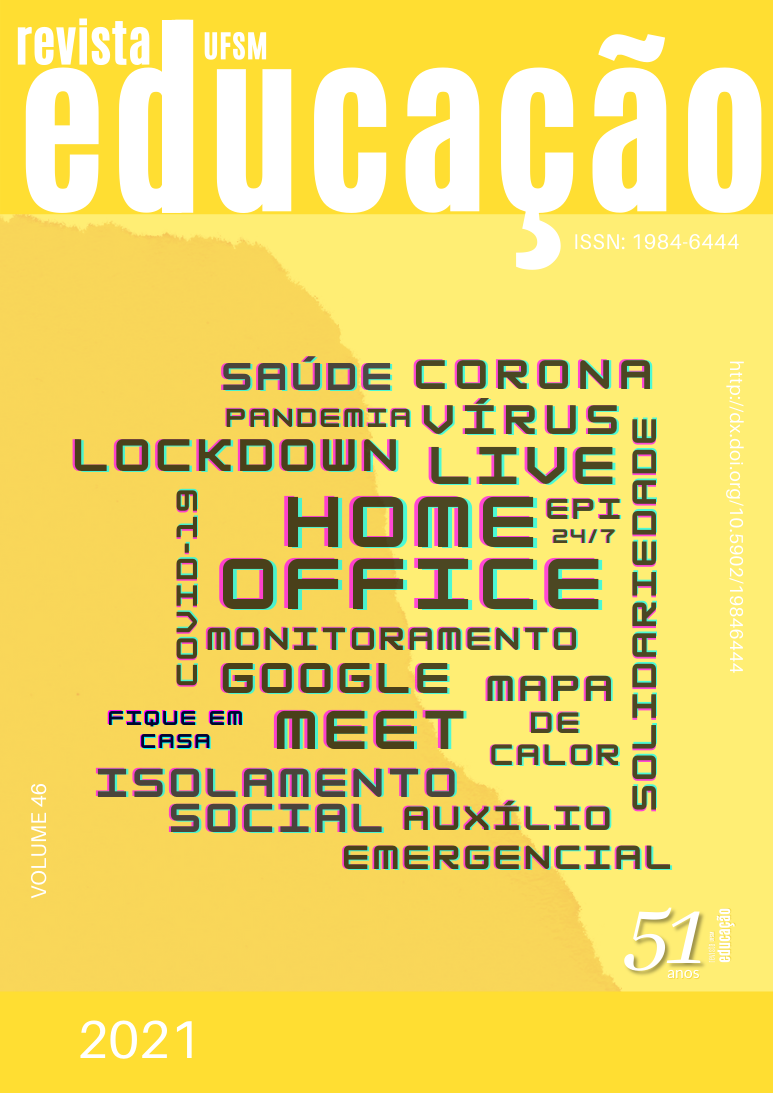The influence of information technologies on experiences experienced in the childhood education area
DOI:
https://doi.org/10.5902/1984644447099Keywords:
Educação Infantil. Tecnologias da Informação. Estudos Culturais.Abstract
The purpose of this essay is to discuss the possible influences of information technologies on the perceptions of time and space in early childhood education, experienced by children and teachers. It is assumed that, nowadays there is a time and a space mediated by information technologies, which build ways of being and being in the world in which the effects of globalization are perceived in different spheres such as Education, from Early Childhood Education to Teaching Higher. The current society provides information technologies available to teachers and other members of the professional teams of educational institutions. With Cultural Studies, we tried to understand the concept of globalization and problematize it about the influences for the teacher, specifically that of Early Childhood Education, examining the mechanisms of accelerated information consumption in the current times. We seek in the trajectory of Early Childhood Education in Brazil the scenario to test the influences of information technologies in educational spaces, observing their influences on children and adults inserted in these places.
References
BARBOSA, Maria Carmem Silveira. Tempo e Cotidiano – tempos para viver a infância. Leitura: Teoria & Prática, Campinas, v.31, n.61, p.213-222, nov. 2013.
BARBOSA, Maria Carmem Silveira; HORN, Maria da Graça Souza. A cada dia a vida na escola com as crianças pequenas nos coloca novos desafios. Para pensar a docência na educação infantil / ALBUQUERQUE, Simone Santos de; FELIPE, Jane; CORSO, Luciana Vellinho. (orgs.). – Porto Alegre: Editora Evangraf, 2019. p. 17-36.
BAUMAN, Zigmunt. 44 Cartas do mundo líquido moderno. Ed. Zahar. 2011.
BRASIL. Ministério da Educação. Secretaria de Educação Básica. Base Nacional Comum Curricular para a educação infantil. Secretaria de Educação Básica. – Brasília: MEC, SEB, 2018.
COSTA, Marisa Vorraber. Estudos culturais, educação e pedagogia. Revista Brasileira de Educação. Maio/Jun/Jul/Ago 2003 Nº 23.
CANTON, Katia. Tempo e Memória. São Paulo: Editora WMF Martins fontes, 2009. – (Coleção temas da arte contemporânea).
FORTUNA, Tânia Ramos. Cultura Lúdica na era digital: possíveis implicações das mídias eletrônicas para o comportamento infanto-juvenil. Para pensar a docência na educação infantil / ALBUQUERQUE, Simone Santos de; FELIPE, Jane; CORSO, Luciana Vellinho (orgs.). – Porto Alegre: Editora Evangraf, 2019. p. 222-237.
HALL, Stuart. A identidade cultural na pós-modernidade. Tradução Tomaz Tadeu da Silva, Guacira Lopes Louro-11. ed. -Rio de Janeiro: DP&A, 2006.
LARROSA, Jorge. Tecnologias do eu e educação. In: Silva, Tomaz Tadeu. O sujeito da educação. Petrópolis: Vozes, 1994, p.35-86.
LARROSA, Jorge. Tremores: escritos sobre experiência. 1.ed.; 2. reimp. – Belo Horizonte: Autêntica Editora, 2016. – (Coleção Educação: Experiência e Sentido).
OLIVEIRA. Zilma de Moraes Ramos de. Educação Infantil: fundamentos e métodos. – 7. Ed. – São Paulo: Cortez, 2011. – (Coleção docência em Formação).
SENNET, Richard. A corrosão do caráter: as consequências pessoais do trabalho no novo capitalismo.- 14 ed. - Rio de Janeiro: Record, 2009.
Published
How to Cite
Issue
Section
License
Declaration of originality
We declare that all articles present in the journal Educação (UFSM) are originals and were not submitted for publishing on any other publication, as a whole or a fraction. We also declare that, after being published by Educação (UFSM), a paper will not be submitted to another journal within two years. After this time, our journal transfers the publishing rights to the authors, with a permit granted by the Editorial Council.
We also acknowledge that the originals’ submission to Educação (UFSM) implies on a transference of copyright for physical and digital publishing to the journal. In case of noncompliance, the violator will receive sanctions and penalties predicted by the Brazilian Copyright Protection Law (n. 9610, dated 19/02/98).
Attribution 4.0 International (CC BY 4.0)
This license lets others remix, transform, and build upon the material for any purpose, even commercially, and copy and redistribute the material in any medium or format.

This work is licensed under a Creative Commons Attribution 4.0 International (CC BY 4.0)






